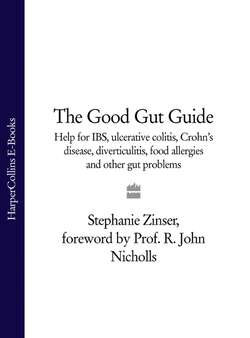Читать книгу The Good Gut Guide: Help for IBS, Ulcerative Colitis, Crohn's Disease, Diverticulitis, Food Allergies and Other Gut Problems - Stephanie Zinser - Страница 20
Self-Help for Diarrhoea
ОглавлениеFluids: If you have diarrhoea and vomiting, it may not be a good idea to drink much for a while, until your stomach can handle a few sips of water. Otherwise, if you’re unaffected by sickness, drink plenty of fluids – bottled water and soft drinks. If you’re abroad and think you may have ‘traveller’s diarrhoea’, avoid all tap water and any drinks containing ice cubes, as these may have been made from tap water.
Balance your electrolytes: Rehydration salts like Dioralyte and Rehidrat are widely available at pharmacies and most supermarkets or grocery stores. These are important as they help restore vital salts like sodium (common salt) and potassium, which are easily lost with diarrhoea. In emergencies, you can easily make your own using basic kitchen ingredients – put a generous pinch of salt and one teaspoon of sugar into 250ml (8fl oz) of cooled boiled water, bottled water or fruit juice.
Anti-diarrhoeal medicines: These are also widely available in stores, pharmacies and airports – look for the drug name ‘loperamide’ or brands like Arret, Diocalm Ultra, Enterocalm and Imodium. Another useful drug is diphenoxylate (Lomotil). These medicines are especially useful if you’re travelling and can’t rely on finding a toilet when you want. However, avoid anti-diarrhoeal medicines if you have severe stomach pains or are bleeding – instead, seek medical advice urgently.
Lower the fibre: Sometimes too much fibre can cause diarrhoea. Children and weaning infants are particularly prone as their digestive systems are not yet used to large quantities of fibrous foods.
Lower the fat: Highly fatty foods can aggravate diarrhoea.
Cut down on food: Your stomach doesn’t want a rich or a heavy meal while you’ve got diarrhoea. Cut down on dairy products and fatty, fried and spicy foods, and stick to light meals and bland foods – crackers, wafers, breadsticks, bananas, soups and broths. Carrot juice may be helpful.
Take care with food and personal hygiene: Many cases of diarrhoea are caused by food poisoning and although it can be serious enough to kill, in most instances food poisoning only results in nausea and/or diarrhoea. Around 100,000 cases of food poisoning are reported in England and Wales every year, although microbiologist Professor Glenn Gibson at Reading University estimates the real figure is up to 20 times higher, because so many cases are mild and therefore go unreported.
Check your medicines: Diarrhoea can be a side effect of many medicines. Check with your pharmacist or doctor that your current medication isn’t causing your diarrhoea, especially if it started around the same time that you began taking the drug.
Antibiotics: Occasionally, your doctor may prescribe a course of antibiotics to treat diarrhoea. Antibiotics should never be taken in order to prevent diarrhoea. Bear in mind that some types of antibiotic may cause mild diarrhoea.
Herbal medicines: Many herbs possess anti-diarrhoeal properties; some, like German chamomile and thyme, are especially useful for treating infant diarrhoea. Chamomile can also be used to help relieve nervous diarrhoea, while garden burnet has traditionally been used to treat acute diarrhoea attacks. Raspberry leaf may also help. Peppermint oil, which acts as an anti-spasmodic agent, can help reduce the stomach cramps that sometimes accompany diarrhoea.
Supplements: Taking live bacteria (probiotics) after an attack of diarrhoea has passed will help repopulate your gut with ‘friendly’ bacteria. They come in the form of yoghurts, drinks and tablets or capsules. They are especially useful if they are ‘enteric-coated’ – that is, protected by a chemical coating so that strong stomach acids cannot kill them. It means that more of the bacteria reach the small and large intestines alive. Check product labels: Lactobacilli (L. acidophilus) and Bifidobacteria (B. longum and B. bifidum) are good bacterial strains.
Chinese herbal medicine: Skullcap root can be useful for treating acute diarrhoea; so can dandelion root and golden thread.
Further information: Digestive Disorders Foundation, www.digestivedisorders.org.uk/Leaflets/diarrhoeNEW.html
